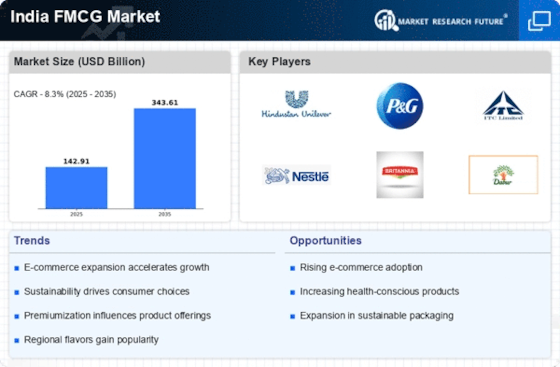Top Industry Leaders in the India FMCG Market

In recent years, there has been a surge in the entry of new and emerging FMCG companies, fueled by changing consumer preferences, advancements in technology, and favorable government policies. Start-ups like Mamaearth, Wow Skin Science, and Purplle are disrupting traditional market dynamics with their focus on natural and organic products, direct-to-consumer models, and digital marketing strategies. These companies, although relatively small in size compared to incumbents, pose a significant threat with their agility, innovation, and ability to quickly adapt to evolving market trends.
Moreover, regional players like Dabur India, Godrej Consumer Products Limited, and Marico also play a crucial role in the FMCG sector, catering to specific consumer preferences and regional demands. These companies often leverage their deep understanding of local markets and consumer behavior to carve out niche segments and gain competitive advantage.
Market share analysis in the Indian FMCG sector is influenced by several factors, including brand loyalty, product quality, pricing strategies, distribution channels, and promotional activities. Companies invest heavily in building brand equity through advertising, sponsorships, and celebrity endorsements to enhance consumer perception and drive sales. Additionally, effective supply chain management and efficient distribution networks play a crucial role in ensuring widespread availability of products, thereby influencing market share.
Industry news often reflects the competitive dynamics and strategic moves within the FMCG sector. Mergers and acquisitions, product launches, expansions into new markets, and collaborations with retailers are common occurrences that shape the competitive landscape. For instance, recent acquisitions by major players like HUL acquiring health food brand Horlicks and ITC's expansion into the packaged food segment through its brand Aashirvaad have strengthened their market positions and diversified their product portfolios.
Furthermore, current company investment trends indicate a focus on innovation, digitalization, and sustainability initiatives. FMCG companies are increasingly investing in research and development to introduce new products catering to evolving consumer preferences, such as plant-based alternatives, eco-friendly packaging, and health-conscious offerings. Additionally, investments in e-commerce platforms, data analytics, and artificial intelligence are enabling companies to enhance consumer engagement, optimize operations, and drive growth in online sales channels.
Overall, the competitive scenario in the Indian FMCG market is characterized by a mix of established players, regional brands, and emerging start-ups vying for market share through innovation, branding, and efficient distribution strategies. With changing consumer lifestyles, rising disposable incomes, and increasing urbanization, the FMCG sector is poised for continued growth and evolution, presenting both challenges and opportunities for companies operating in this highly competitive landscape.
Key Companies in the FMCG market include
- Hindustan Unilever Ltd.
- Nestlé India
- Cadbury India
- ITC (Indian Tobacco Company)
- Asian Paints (India)
- Procter & Gamble Hygiene and Health Care
- AMUL
- Dabur India
- Britannia Industries
- Marico Industries
- Colgate Palmolive
- PepsiCo
- Unilever
- AB InBev
- Coca-Cola











